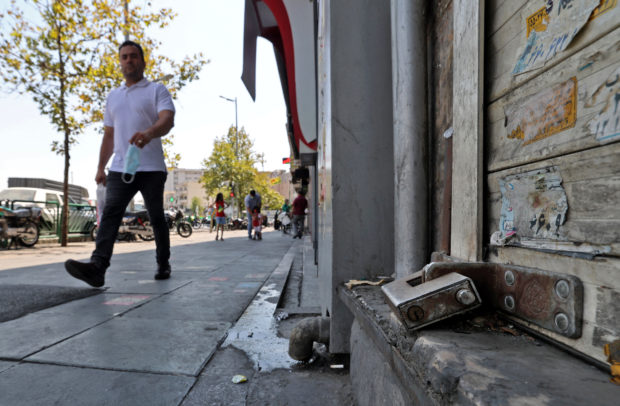
An Iranian man walks past a shuttered store in the capital Tehran, on July 20, 2021, as authorities tighten restrictions amid the COVID-19 pandemic. AFP FILE PHOTO
TEHRAN — Iran reported over 500 daily Covid deaths for the first time on Sunday, its health ministry announced, as new infections also hit a record high.
Iran registered 39,619 new infections in the 24 hours to Sunday, taking the total since the pandemic started to 4,158,729, the ministry said.
During that same period it recorded 542 deaths, taking the total number of fatalities to 94,015, it added.
Iranian health officials have acknowledged that the Islamic republic’s Covid figures underestimate the real toll.
But Iran remains the Middle East country worst hit by the pandemic.
Covid infections have been surging since late June, in what officials have warned is a “fifth wave” caused by the highly infectious Delta variant.
Daily infections have hit several records over the past few weeks.
The previous recorded high for fatalities was 496, registered on April 26, at the height of the Islamic republic’s previous wave.
Iran’s state television said hospitals across the country were facing a “crisis” and described the health situation as bleak.
“Although the vaccination pace has been accelerating, the observation of health protocols has dropped significantly,” it said.
Iran has pinned its hopes on vaccinations to help with the health crisis.
But the inoculation campaign launched in February has progressed more slowly than authorities had planned.
Choked by US sanctions that have made it difficult to transfer money abroad, Iran says it is struggling to import vaccines for its population of 83 million.
More than 12.5 million people have been given a first vaccine does, but only 3.7 million have received the necessary two jabs, the health ministry said on Sunday.
Raisi said Saturday that a “plan to transform the way to confront the coronavirus” was to be reviewed next week.
He did not give any details, but said on Sunday that accelerating the pace of vaccinations is one of his government’s priorities, according to the president’s official website.
Chairing a Covid taskforce meeting, he also vowed on Saturday to “support domestic vaccine production” while “not hesitating” to import jabs from abroad.
The authorities have approved the emergency use of two locally produced vaccines, with the only mass-produced one, COVIran Barekat, still in short supply.
The other vaccines used in Iran include Russia’s Sputnik V, China’s Sinopharm, India’s Bharat and AstraZeneca/Oxford, according to the health ministry.
Raisi and parliament speaker Mohammad Bagher Ghalibaf received their first Barekat jab on Sunday, state TV said.
Last week, supreme leader Ayatollah Ali Khamenei ordered the government to take “necessary measures” to contain the spread of the pandemic.
Iran has avoided imposing a full lockdown on the population, and instead resorted to piecemeal measures such as temporary travel bans and business closures.
Outgoing health minister Saeed Namaki has recently suggested a two-week shutdown to help contain the spread of the virus.